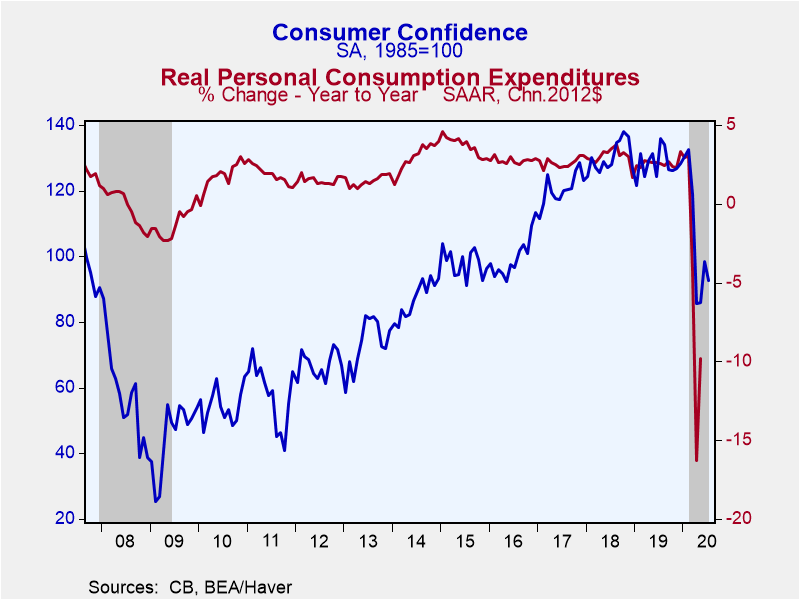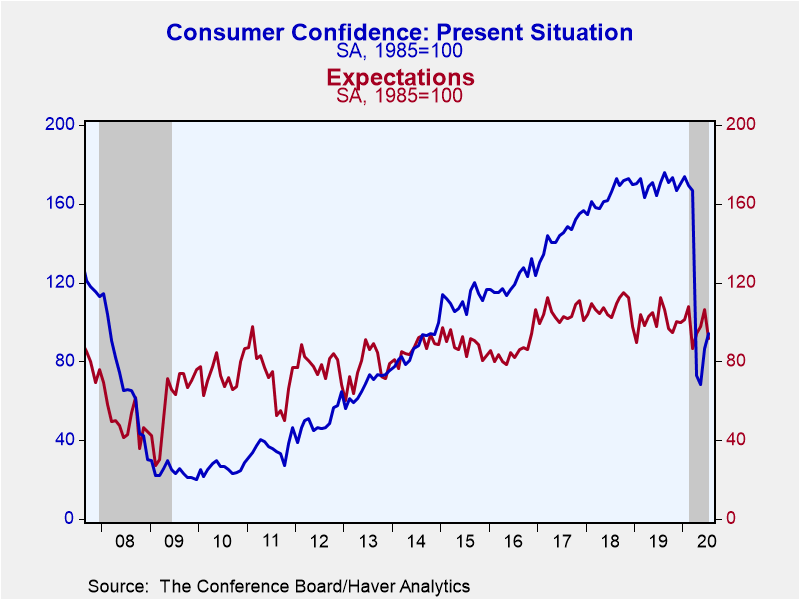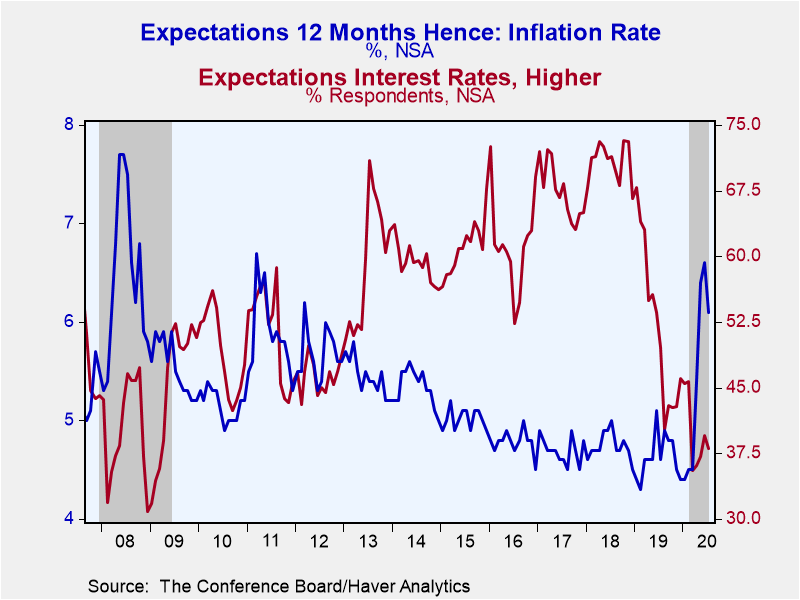 Global| Jul 28 2020
Global| Jul 28 2020U.S. Consumer Confidence Backpedals in July
by:Tom Moeller
|in:Economy in Brief
Summary
• Worries about the future emerge. • Reading of current conditions continues to increase. • All age groups become less confident. Consumer confidence weakened in July, according to the Conference Board. The Index of Consumer [...]
• Worries about the future emerge.
• Reading of current conditions continues to increase.
• All age groups become less confident.
Consumer confidence weakened in July, according to the Conference Board. The Index of Consumer Confidence fell 5.8% (-31.8% y/y) to a level of 92.6 from a June level of 98.3. Despite the decline, confidence was 8.1% improved versus its April low, but down roughly one-third y/y. A decline to an index level of 95.0 had been expected in the Action Economics Forecast Survey. Over the last 25 years, there has been a 58% correlation between the level of confidence and the y/y change in real consumer spending.
The index of expected business conditions in six months fell 13.8%, following an 8.7% rise in June. A greatly lessened 31.6% of respondents felt that would business conditions would improve, down from 42.5% in May. Thirty-one percent of respondents felt that there would be more jobs in six months, down from 41.2% in April. Only a steady 15.1% thought that income would increase.
The index of current conditions improved 8.7% after surging 26.8% in June. Nevertheless, it remained down 44.9% y/y. A steady 17.3% of respondents felt that business conditions were good, but a higher 39.1% felt that they were bad. Jobs were viewed as plentiful by 21.3% of respondents, half of those who felt so in June 2019. Jobs were viewed as hard to get by a greatly lessened 20.0% of respondents, down from 34.5% in April.
Expectations for the inflation rate in twelve months eased to 6.1%. It remained, however, well above the 4.4% rate expected six months ago. Interest rates were expected to move higher in twelve months by a lessened 38.1% of respondents, half of 2018's expectations. A greatly lessened 1.0% planned to buy a new home. A steady 3.9% planned to buy a new car within six months, while a greatly lessened 43.5% planned to buy a major appliance, down from February's high of 55.0%.
By age group, the index of confidence amongst those under age 35 fell a sharp 17.7% (-32.6% y/y) followed by deterioration in other age groups. For respondents aged 35-54, confidence fell 3.3% (-35.9% y/y). For those aged 55 and over, confidence weakened 3.4% (-27.7% y/y).
The Consumer Confidence data are available in Haver's CBDB database. The total indexes appear in USECON, and the market expectations are in AS1REPNA.
| Conference Board (SA, % Chg.) | Jul | Jun | May | Jul Y/Y | 2019 | 2018 | 2017 |
|---|---|---|---|---|---|---|---|
| Consumer Confidence Index | -5.8 | 14.4 | 0.2 | -31.8 | -1.4 | 8.0 | 20.7 |
| Present Situation | 8.7 | 26.8 | -6.3 | -44.9 | 3.1 | 13.8 | 20.3 |
| Expectations | -13.8 | 8.7 | 3.5 | -18.6 | -6.0 | 2.6 | 21.1 |
| Consumer Confidence By Age Group | |||||||
| Under 35 Years | -17.7 | 32.1 | -10.7 | -32.6 | 0.3 | 2.7 | 6.4 |
| Aged 35-54 Years | -3.3 | 8.1 | 3.3 | -35.9 | -1.1 | 7.0 | 16.4 |
| Over 55 Years | -3.4 | 14.5 | 2.5 | -27.7 | -1.9 | 11.8 | 33.5 |
Tom Moeller
AuthorMore in Author Profile »Prior to joining Haver Analytics in 2000, Mr. Moeller worked as the Economist at Chancellor Capital Management from 1985 to 1999. There, he developed comprehensive economic forecasts and interpreted economic data for equity and fixed income portfolio managers. Also at Chancellor, Mr. Moeller worked as an equity analyst and was responsible for researching and rating companies in the economically sensitive automobile and housing industries for investment in Chancellor’s equity portfolio. Prior to joining Chancellor, Mr. Moeller was an Economist at Citibank from 1979 to 1984. He also analyzed pricing behavior in the metals industry for the Council on Wage and Price Stability in Washington, D.C. In 1999, Mr. Moeller received the award for most accurate forecast from the Forecasters' Club of New York. From 1990 to 1992 he was President of the New York Association for Business Economists. Mr. Moeller earned an M.B.A. in Finance from Fordham University, where he graduated in 1987. He holds a Bachelor of Arts in Economics from George Washington University.
More Economy in Brief
 Global| Feb 05 2026
Global| Feb 05 2026Charts of the Week: Balanced Policy, Resilient Data and AI Narratives
by:Andrew Cates










